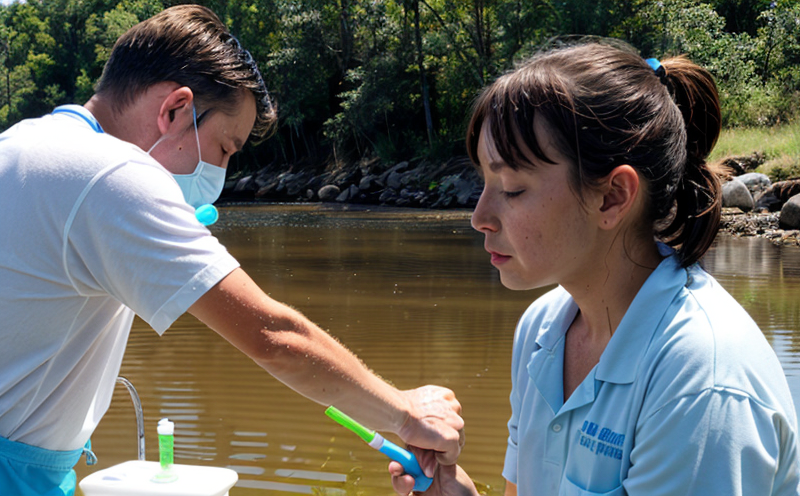EPA 160.5 Fixed Solids Test in Water
The EPA Method 160.5 is a standardized procedure used to determine the fixed solids content in water samples, which plays a critical role in assessing the quality of water from various sources such as industrial processes, wastewater treatment facilities, and potable water supplies.
Fixed solids are defined as those that remain after drying a sample at 103°C ± 2°C for 2 hours. This method is particularly important because it helps identify suspended particles in the water that can affect its clarity, taste, and overall quality. The test results provide essential data for regulatory compliance and process optimization.
The procedure involves several steps: first, a specified volume of the sample is weighed accurately into an oven-dried filter. Then, this mixture is dried at 103°C ± 2°C until constant weight is achieved. After drying, it is then cooled to room temperature in a desiccator and reweighed.
The calculation involves determining the difference between the initial weight of the filter plus sample before drying and the final weight after drying. This value represents the fixed solids content expressed as milligrams per liter (mg/L).
This test is critical for ensuring that water meets regulatory standards set by environmental agencies like the U.S. Environmental Protection Agency (EPA) and the European Union’s Drinking Water Directive.
For industries dealing with wastewater or industrial processes involving water, this method helps monitor effluent quality and ensures compliance with discharge limits specified in permits. In potable water supplies, it supports the maintenance of safe drinking water standards as defined by the EPA's Safe Drinking Water Act (SDWA).
The precision and accuracy of these tests are crucial for maintaining reliable data that can inform management decisions regarding process adjustments or regulatory compliance.
Benefits
- Regulatory Compliance: Ensures adherence to EPA standards and other relevant regulations, thereby avoiding fines and legal issues.
- Precision in Process Control: Provides accurate data that can be used to fine-tune industrial processes, ensuring optimal performance and efficiency.
- Safeguarding Public Health: By detecting potential contaminants early, this test helps protect public health and safety.
- Data Reliability: Standardized methods like EPA 160.5 provide consistent results that are repeatable and comparable over time or across different facilities.
Eurolab Advantages
Eurolab offers comprehensive water quality testing services, including EPA Method 160.5 for fixed solids analysis. Our expertise in this field is complemented by state-of-the-art facilities and highly trained technicians who ensure precise and accurate results.
We provide a range of additional services that can support your compliance efforts, such as nutrient analysis, heavy metals testing, and microbial assessments. These services are designed to give you the full picture of water quality, helping you make informed decisions for your operations or product development.
Our commitment to accuracy is further enhanced by our adherence to international standards like ISO 17025, which ensures that all our laboratory practices meet the highest quality requirements. This standardization guarantees consistency in results and reliability of data across various testing methods.
We also offer quick turnaround times for test results, enabling you to receive your reports promptly so that you can address any issues or take necessary actions swiftly. Our transparent communication ensures that you are always informed about the progress of your samples.
Quality and Reliability Assurance
At Eurolab, maintaining quality and reliability in our testing processes is a top priority. We employ rigorous quality control measures to ensure that every test conducted meets the highest standards of accuracy and precision.
We have invested heavily in modern laboratory equipment that adheres to the latest technological advancements. This investment ensures we can perform complex analyses with ease while maintaining the integrity of our results. Our instruments are regularly calibrated against international standards such as ISO 17025, ensuring consistent performance over time.
In addition to our technical capabilities, Eurolab’s quality assurance program includes strict adherence to procedural guidelines provided by authoritative sources like EPA Method 160.5. This commitment guarantees that all tests are conducted uniformly and consistently across our facilities worldwide.
We also maintain detailed records of each test performed, including calibration certificates and maintenance logs. These documents serve as a comprehensive audit trail that can be reviewed anytime should any discrepancies arise or additional verification be required.





